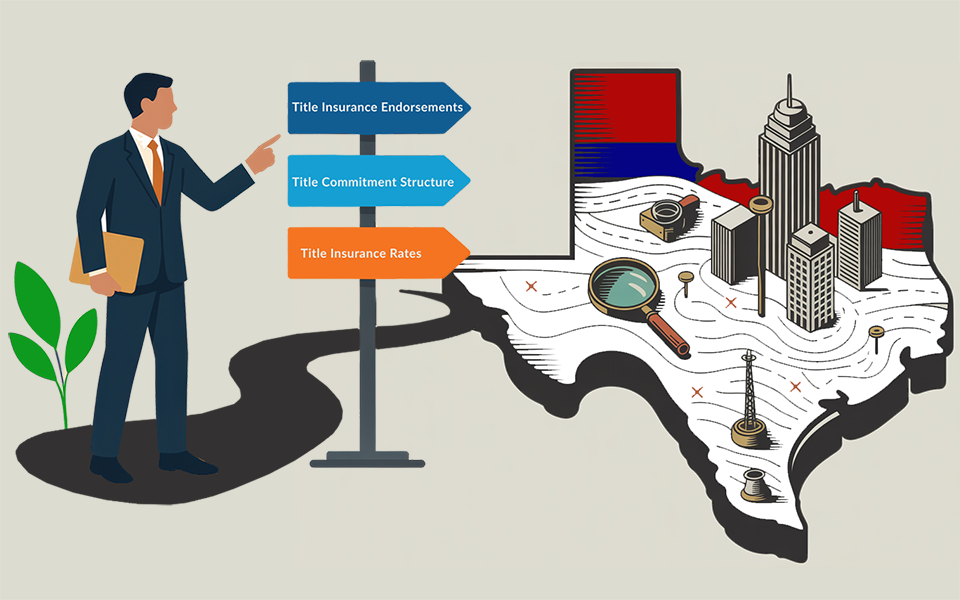December 22, 2025
UCC Search vs. Title Search: What's the Difference — and Do You Need Both?

In the complex world of real estate transactions, due diligence is everything. Whether you're a lender evaluating a loan application, an investor considering a commercial property, or an attorney managing a closing, understanding the various search options available is critical to protecting your interests and those of your clients.
Two essential tools in this process are Title Searches and UCC Searches. While both serve important functions in the closing process, they address different aspects of property ownership and encumbrances. This article will break down the key differences, explain when each is appropriate, and help you determine when both might be necessary for your transaction.
Understanding Title Searches
A title search is a thorough examination of public records to determine and confirm a property's legal ownership and identify any claims, defects, or encumbrances that might affect the title to the property. This critical step in real estate transactions protects buyers and lenders by uncovering potential issues before the transaction is completed.
What Does a Title Search Examine?
Title searches typically investigate several decades of property history and examine various public records, including:
- Property deeds and conveyances: Documents showing transfers of ownership
- Mortgages and deeds of trust: Records of existing loans secured by the property
- Liens: Including tax liens, mechanics liens, judgment liens, and other financial claims
- Easements and encroachments: Rights-of-way and other non-owner usage rights
- Covenants, conditions, and restrictions (CC&Rs): Legal obligations imposed on the property
- Property tax records: Confirming payment status and potential tax liens
- Probate and court records: Checking for judgments, bankruptcies, or divorce proceedings affecting title
- Plat maps and surveys: Confirming property boundaries and potential encroachments
A comprehensive title search will examine county records, court filings, tax assessor data, and other relevant sources to build a complete picture of the property's legal status. Title professionals typically compile this information into a preliminary title report or commitment for title insurance, which outlines their findings and any exceptions to coverage.
The Purpose and Process of Title Searches
Title searches serve several essential purposes:
- Confirming ownership: Verifying that the seller owns the property and has the legal right to transfer it
- Identifying encumbrances: Discovering any claims, liens, or restrictions that could affect use or value
- Establishing chain of title: Tracing the history of ownership transfers to ensure proper conveyance
- Facilitating title insurance: Providing the foundation for title insurance underwriting
The typical title search process involves the following:
- Researching public records at the county recorder's office
- Examining court records for judgments or proceedings against owners
- Investigating tax records for delinquencies or assessments
- Reviewing planning and zoning information
- Checking for bankruptcy filings that might affect the property
- Compiling findings into a preliminary title report
Title searches primarily focus on real property – the land and permanent structures attached to it. This distinction becomes important when we compare them to UCC searches.
Understanding UCC Searches
The Uniform Commercial Code (UCC) is a standardized set of laws governing commercial transactions across all U.S. states. Article 9 of the UCC specifically addresses secured transactions, where lenders gain security interests in a borrower's personal property as collateral for loans.
What is Personal Property?
In contrast to real property (land and buildings), personal property includes movable assets like:
- Equipment and machinery
- Inventory and goods
- Accounts receivable
- Investment securities
- Deposit accounts
- Intellectual property
- Fixtures (items attached to real property that may legally be treated as personal property)
How UCC Filings Work
When a lender provides financing secured by personal property, they typically file a UCC financing statement (often called a UCC-1) to perfect their security interest – essentially putting the world on notice of their claim to those assets. These filings:
- Establish priority among creditors
- Create a public record of the security interest
- Include information about the debtor, secured party, and collateral
- Generally last for five years before requiring continuation
UCC filings are made at the state level, typically with the Secretary of State in the state where the debtor is located or organized. For fixtures – items that straddle the line between personal and real property – UCC fixture filings are often made at the county level, similar to real property records.
What Does a UCC Search Include?
A UCC Search examines these filings to identify existing security interests in a debtor's personal property. A thorough UCC Search will:
- Search by debtor name and variations
- Identify all active UCC-1 financing statements
- Check for UCC-3 amendments, continuations, or terminations
- Include federal and state tax liens
- Check for litigation, judgments, and bankruptcies
- Examine both state-level and relevant county-level filings
For real estate transactions, UCC Searches become particularly important when dealing with properties that include significant personal property components or fixtures that could have separate financing.
Key Differences Between UCC and Title Searches
Now that we've established the basics of each search type let's examine their key differences:
Property Type Focus
Title Searches:
- Focus on real property (land and attached structures)
- Examine ownership rights and encumbrances to the real estate itself
- Deal with deeds, mortgages, and other instruments recorded in property records
UCC Searches:
- Focus on personal property (movable assets and some fixtures)
- Examine security interests in equipment, inventory, and other business assets
- Deal with financing statements filed under the Uniform Commercial Code
Filing Locations
Title Searches:
- Primarily conducted at county recorder's offices where the property is located
- Involve searching local government records
- May include multiple counties if the property spans jurisdictional boundaries
UCC Searches:
- Primarily conducted at the state level (Secretary of State)
- May include county-level searches for fixture filings
- Require searching in the state where the debtor is organized or located
Legal Framework
Title Searches:
- Governed by state property laws and recording statutes
- Focus on determining legal ownership rights
- Support title insurance issuance
UCC Searches:
- Governed by Article 9 of the Uniform Commercial Code
- Focus on determining the priority of security interests
- Support lender protection for personal property collateral
Depth and Timeline
Title Searches:
- Often extend back decades to establish a clear chain of title
- Involve more complex interpretation of legal documents
- Typically take longer to complete (3-7 business days for standard searches)
UCC Searches:
- Focus primarily on current and active filings within the past five years
- Involve more straightforward debtor-name searches
- Can often be completed more quickly (1-3 business days)
When You Need a Title Search
Title searches are essential in virtually all real estate transactions, but they're particularly critical in these scenarios:
Standard Real Estate Purchases
Any property acquisition should include a thorough title search to verify ownership and identify potential issues, whether residential or commercial. Buyers and their lenders need confidence that they're receiving clear title without unexpected claims or encumbrances.
Refinancing Scenarios
Lenders require title searches when refinancing to ensure their new mortgage will have the expected priority position and that no new liens or judgments have been recorded since the original financing.
Property with a Complex History
Properties with previous title issues, multiple transfers, foreclosure history, or those coming from estate sales often require exceptionally detailed title searches to resolve any potential clouds on title.
Development Projects
Before investing significant resources in development, a comprehensive title search helps identify easements, restrictions, or other issues that could impact development plans.
When You Need a UCC Search
UCC searches become essential in several key scenarios:
Commercial Real Estate Acquisitions
When purchasing commercial property that includes significant business assets, a UCC search helps identify whether equipment, fixtures, or other personal property has been pledged as collateral for existing loans.
Business Asset Purchases
If you're acquiring business assets rather than real estate, UCC searches are critical to ensure you receive clear title to those assets without undisclosed liens.
SBA and Commercial Lending
Lenders making SBA or commercial loans typically require UCC searches to verify that the collateral offered for the loan isn't already pledged to other creditors.
Transactions Involving Fixtures
When real estate includes valuable fixtures that may be treated as personal property under the UCC (like specialized HVAC systems, built-in equipment, etc.), UCC searches help identify potential competing claims.
When You Need Both
Several transaction types benefit from both search types working in tandem:
Mixed-Use Properties
Properties combining residential, commercial, or industrial elements often involve significant real estate and personal property components, making both search types advisable.
Hotel and Hospitality Acquisitions
Hotels involve property (the building and land) and substantial personal property (furniture, equipment, systems) that may have separate financing.
Manufacturing Facilities
Manufacturing properties typically include real estate and valuable equipment, requiring comprehensive due diligence through both search types.
Medical Facilities and Hospitals
Healthcare properties often contain expensive medical equipment that may be subject to separate financing agreements discoverable through UCC searches.
Agricultural Properties
Farms and agricultural businesses involve land (title search) and equipment (UCC search) that should be verified separately.
When dealing with these complex property types, the complementary information provided by both search types creates a comprehensive view of potential title and lien issues that could affect the transaction.
Integration of UCC and Title Searches: Best Practices
For transactions requiring both search types, consider these best practices:
Timing Considerations
- Begin both searches early in the due diligence process
- Allow sufficient time for research, especially in complex transactions
- Consider preliminary searches before committing significant resources
Coordination Strategy
- Use the same service provider when possible for both search types
- Ensure search results are analyzed together for a complete picture
- Create a comprehensive checklist that incorporates findings from both
Documentation Management
- Maintain clear records of all search results
- Address exceptions or issues promptly with appropriate instruments
- Ensure all stakeholders understand the implications of the findings
Priority Determinations
- Analyze how UCC fixture filings interact with real property interests
- Determine priority between mortgage liens and fixture filings
- Obtain subordination agreements when necessary
Common Issues Revealed Through Combined Searches
The power of utilizing both search types becomes evident when considering the various issues they can collectively uncover:
Hidden Financing on Critical Components
A hotel purchase might show a clear real property title, but UCC searches could reveal that all the furnishings are subject to equipment financing liens.
Double-Pledged Collateral
A property owner might have pledged built-in equipment through a mortgage and separate equipment financing.
Fixture Filing Priority Conflicts
In some cases, fixture filings may have priority over mortgage interests, creating unexpected complications for lenders.
Equipment Subject to Lease Agreements
Title searches won't reveal that critical building systems are leased rather than owned – information discoverable through proper UCC due diligence.
Creating a Comprehensive Pre-Closing Checklist
To ensure nothing falls through the cracks, develop a comprehensive checklist that incorporates both search types:
- Initial property assessment
- Identify real property components
- Inventory significant personal property and fixtures
- Determine appropriate search types needed
- Search ordering process
- Order title search from county records or through a reputable title support company like Skyline
- Order UCC searches at the state level
- Request fixture filing searches at the county level
- Review and analysis
- Analyze title commitment/preliminary report
- Review UCC search results
- Cross-reference findings to identify potential conflicts
- Issue resolution
- Address title exceptions
- Obtain UCC terminations or subordinations as needed
- Document resolution of all identified issues
- Final verification
- Conduct pre-closing updates of both search types
- Verify all required releases have been obtained
- Confirm closing documents address all discovered issues
How Skyline Title Support Can Help
At Skyline Title Support, we understand the complex interplay between Title Searches and UCC Searches. Our team of experienced professionals provides comprehensive search services across multiple states, delivering the detailed information you need for thorough due diligence.
Our approach includes:
- Coordinated search services that integrate findings from both search types
- Expert analysis of complex results
- Multi-state capabilities for regional or national transactions
- Customized reporting tailored to your specific needs
- Prompt turnaround times to meet closing deadlines
By partnering with Skyline for your pre-closing support needs, you gain access to thorough, reliable information that helps protect your interests and those of your clients.
Conclusion: The Power of Comprehensive Due Diligence
In today's complex real estate environment, thorough due diligence requires a multifaceted approach. While title searches remain the foundation of real property transactions, UCC searches provide essential complementary information for business assets, fixtures, and equipment transactions.
Understanding when each search type is appropriate and when both are necessary enables you to structure transactions confidently, protect your interests, and avoid unwelcome surprises after closing.
Whether you're a lender evaluating collateral, an investor assessing acquisition targets, or an attorney guiding clients through complex transactions, a comprehensive search strategy incorporating title and UCC due diligence provides the information foundation for successful outcomes.
For your next transaction requiring detailed pre-closing support, consider how both search types might work together to provide the complete picture you need. When you're ready for comprehensive search services, Skyline Title Support can help you navigate the process with expertise and efficiency.
Related Posts
How to Read a Title Commitment: 12 Exceptions That Scare Buyers (But Don’t Always Kill the Deal)
If you have ever opened a title commitment and felt your stomach drop when you hit the exceptions, you are not alone. Buyers often see a long ....
January 29, 2026
2026 Title Industry Outlook: Top 10 Trends That Will Redefine Due Diligence and Closings
The title industry is heading into 2026 with more moving parts than at any time in recent memory: rapid regulatory change, deeper fraud risk ...
December 22, 2025
Beyond the Basics: Navigating Title Complexity in Texas Commercial Real Estate
Last spring, a Dallas investor was three days from closing on a mixed-use development site when the title examiner discovered something unusual ...
December 22, 2025
Witchy Titles & Cursed Closings: What Salem’s History Can Teach Us About Real Estate Due Diligence
In 1692, the town of Salem, Massachusetts descended into chaos. Fueled by fear, rumors, and suspicion, dozens of people were accused of witchcraft and ...
December 22, 2025
Title Under Siege: A First Look at Our New Guide to Deed Fraud and Seller Impersonation
Seller impersonation, in particular, is on the rise. In these cases, a scammer poses as the property owner—usually targeting vacant land, rental...
December 22, 2025
Real Estate Due Diligence Checklist: 9 Hidden Costs That Kill Closings
Imagine this: A $3.2 million Miami Beach home sale implodes because of a $127 unpaid utility lien that no one caught in time. Absurd as it sounds ...
December 22, 2025
Mastering UCC Searches: A Comprehensive Guide for Title Professionals and Lenders
In the world of commercial real estate and lending, due diligence is everything. Whether you're a title agent preparing for a closing in New York ...
December 22, 2025
Land Surveys vs. Title Searches: When You Need Both (and How to Budget)
Picture this: you’re days away from closing on a home when an unexpected hiccup surfaces. The seller’s old fence sits two feet inside the neighbor’s...
December 22, 2025
Top 10 Municipal Red Flags That Can Delay Your Closing (and How to Fix Them)
Real-estate contracts are filled with dates, deposits, and delivery deadlines. Yet even when buyers, sellers, and lenders stay on schedule ...
December 22, 2025
How Can Large Title Companies Thrive in Volatile Times?
When mortgage rates climbed to 23-year highs in late 2023, one national title insurer watched transaction volume plummet 45% over eight weeks yet ...
December 22, 2025
Navigating Florida’s Title Regulations for Small Title Agencies
Running a small to mid-sized title agency in Florida can feel like juggling flaming torches—there’s licensing, escrow accounting, audits, data security ...
December 22, 2025
Top Mistakes When Ordering a UCC Search
UCC Searches are crucial in risk assessment and due diligence in commercial lending and secured transactions. Yet despite their importance, we have ...
December 22, 2025
The Title Pro's AI Companion: Using Skyline's SmartTitle Assistant
How much time did you spend drafting repetitive client emails today? Our average title professional saves 5+ hours weekly using SmartTitle Assistant™ ...
December 22, 2025
Navigating Market Volatility: What Title Professionals Need to Know Now — and What's Ahead in 2025
In today's real estate landscape, the only constant is change. Fluctuating interest rates, economic uncertainty, and shifting regulatory policies have ...
December 22, 2025
Generating New Business for Title Companies in a Competitive Market
The title industry is transforming. Increased competition, technological advancements, and shifting consumer expectations are challenging traditional ...
December 22, 2025
Spring Cleaning for Your Property Title: How to Refresh Your Real Estate Records
Millions of real estate transactions are delayed or fall apart each year due to title issues that could have been prevented. In fact, a recent study ...
December 22, 2025
Top Strategies to Prevent Quiet Title Issues
Quiet title disputes are a serious concern for real estate professionals, as they can disrupt transactions and create uncertainty around property ownership ...
December 22, 2025
Title Services for New Construction: What Builders and Developers Need to Know
The construction of a new home or commercial property is an exciting and ambitious project, but it comes with more than just design and building ...
December 22, 2025
Will AI Agents Replace Title Professionals? The Truth About Automation
Artificial intelligence (AI) has evolved beyond simple data analytics and chatbots. Today's AI "agents" can interact with web browsers, gather and analyze ...
December 22, 2025
Title Industry 2.0: Harnessing AI, Data, and Cybersecurity for a Resilient Future
The title industry is at a crossroads. Traditional methods that have served us well for decades now face mounting challenges in an increasingly ...
December 22, 2025
How Title Services Impact Mortgage Underwriting Timelines
In the world of real estate, the journey from application to closing is filled with numerous moving parts. Among these, title services are a crucial yet ...
December 22, 2025
How Title Companies Can Meet Tight Deadlines Without Sacrificing Quality
In today's fast-paced real estate environment, speed is crucial. Title companies often find themselves in high-pressure situations where they must juggle ...
December 22, 2025
5 New Year's Resolutions for Title Companies in 2025
As 2025 kicks off, the title industry is moving faster than ever. With new technologies, shifting customer needs, and more complex regulations, there’s ...
December 22, 2025
How to Explain Title Insurance to Your Clients: A Real Estate Agent's Guide
Explaining title insurance isn't always straightforward, but with the right approach, it can become a valuable teaching moment for your clients. Picture this ..
December 22, 2025
The Hidden Complexities of Property Title Searches
You've found your dream home. The price is right, the location is perfect, and you're ready to sign on the dotted line. But before you do ...
December 22, 2025
What’s Next for the Title Industry? Key Trends for 2025
The title industry is at a pivotal moment, with 2025 shaping up to be a year of significant transformation. From groundbreaking technologies like blockchain ...
December 22, 2025
Commercial Property Title Due Diligence: Going Beyond the Basics
The landscape of commercial property title due diligence has transformed dramatically over the past three decades. Gone are the days when a basic title ...
December 22, 2025
Beyond the Standard Search: Advanced Commercial Title Due Diligence in Florida
Last month in South Florida, a seasoned commercial real estate investor nearly walked away from a $12 million mixed-use development purchase ...
December 22, 2025
Navigating the Cyber Minefield: A Title Professional's Complete Guide to Phishing Defense
The title industry is a prime target for cybercriminals, and phishing is one of the most common threats that title professionals face today. Imagine this ...
December 22, 2025
Elevating Your Title Company to New Heights - A Blueprint for Growth
Let's be honest – growing a title company isn't what it used to be. Gone are the days when simply maintaining the status quo was enough to ...
December 22, 2025
This Halloween Avoid Real Estate Nightmares: 5 Spooky Title Issues That Can Haunt You
Buying a new home is exciting, but not all surprises are welcome. Some title issues can be like ghostly figures lurking in the shadows ...
December 22, 2025
How to Overcome Common Title Operations Challenges and Boost Efficiency
Running a title company means you’re a key player in the real estate world, making sure property transactions go smoothly and securely. But, we get it ....
December 22, 2025
🎙️QuickCast: Future Trends in the Title Industry.
The title industry, like many others, is undergoing significant transformation due to technological advancements. While some of these changes ...
December 22, 2025
Wire Fraud : Proven Defense Tactics for Title Professionals
Wire fraud is a rapidly growing threat in the real estate industry, with fraudsters becoming more sophisticated and aggressive in their ...
December 22, 2025
Preparing for August 17th: Essential Information on the NAR Broker Commission Changes
The real estate market is about to undergo significant changes as new commission regulations take effect on August 17. These changes ...
December 22, 2025
Maximize Efficiency in Your Title Business with AI
Integrating AI into title businesses can significantly enhance efficiency, accuracy, and customer service. By automating routine tasks, improving...
December 22, 2025
Summer Selling Season: Essential Steps for Real Estate Pros to Ensure Smooth Transactions
Essential steps for real estate professionals to ensure smooth transactions during the bustling summer selling season include preparing properties, ...
December 22, 2025
Recent Posts













































.png)


